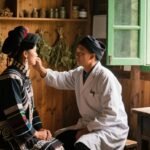Luogan’guo (Seminal Emission)
[Overview]
In Miao medicine, seminal emission is referred to as Luogan’guo. Clinically, it is classified into two types: the mild form manifests as nocturnal emission, while the severe form is spontaneous seminal emission. It is often caused by overwork damaging internal organs, excessive anxiety disturbing the heart-spirit, or congenital deficiency leading to involuntary ejaculation.
In Traditional Chinese Medicine (TCM), seminal emission is generally due to kidney deficiency resulting in a failure to retain essence, or due to excessive Minister Fire or downward flow of damp-heat disturbing the sperm chamber, causing semen to be discharged without sexual activity.
In Western medicine, seminal emission refers to ejaculation occurring without sexual intercourse. It is a common physiological phenomenon in males after puberty. However, if emission occurs multiple times a week or even several times a night, or is triggered by brief sexual arousal, or if a married man continues to experience emissions despite a regular sex life, it is considered pathological and falls under sexual dysfunction.
[Huhou Jipeng · Miao Medicine Syndromes]
Miao medicine classifies this condition into two syndromes: Cold Seminal Emission in Men and Hot Seminal Emission in Men. The term “funan” (literally “women and men”) is a cultural remnant of the Miao matrilineal clan system and is used as a prefix for male diseases.
[Aijiangduo · Causes]
Miao medicine believes that at birth, humans possess shengling neng (vital energy). This energy transforms external nutrients into essential bodily fluids such as blood and essence. Spontaneous emission is often due to prolonged or excessive labor that weakens the internal organs and kidneys, preventing proper essence retention; or due to emotional distress damaging the heart-spirit and disturbing the sperm chamber; or from congenital kidney weakness and essence leakage.
[Gengduomeng · Pathogenesis]
This condition results from long-term overwork that harms the kidneys and causes kidney deficiency, reducing the source for seminal fluid production. It can also result from congenital weakness, leading to involuntary nocturnal emissions; or from chronic illness damaging both the spirit and essence, leading to uncontrolled emission; or from excessive sexual thoughts draining the heart-spirit and triggering deficient heart fire, resulting in thin seminal fluid leaking day and night, sometimes accompanied by emaciation and yellowish complexion.

[Diagnostic Points]
Diagnosis Criteria:
Frequent nocturnal emission (≥2 times/week), or ejaculation during waking hours without sexual activity.
Common symptoms include dizziness, fatigue, soreness in the lower back and knees, insomnia, and anxiety.
History of indulgence in sex, emotional trauma, spicy diet, alcohol consumption, etc.
Recommended Tests:
Routine blood and urine tests, prostatic fluid smear, prostate ultrasound, and semen analysis. If necessary, test for semen antigens to differentiate from neurasthenia, prostatitis, or seminal vesiculitis.
[Differential Diagnosis]
Luogan’guo Xian (Premature Ejaculation):
Luogan’guo refers to ejaculation without intercourse, while Luogan’guo Xian refers to ejaculation at the beginning or even before intercourse, preventing normal sexual activity.
Yubeilou (Emission Upon Visual Arousal):
This refers to involuntary semen leakage upon seeing a beloved woman, due to a deficiency in sexual energy, making it impossible to control ejaculation.
[Syndrome Classification and Treatment]
Cold-Type Seminal Emission in Men
Mengli Duo (Symptoms): Nocturnal emissions during sleep, dizziness, tinnitus, lower back soreness, dry mouth, yellow urine, dry stools, pale complexion, shortness of breath, poor appetite, semen in urine.
Xingleng (Syndrome Nature): Belongs to cold-type meridians and conditions.
Jiahe Meng (Therapeutic Principles): Nourish the liver and kidneys (zi gan bu shen), support yin and yang (yang yin fu yang).
Ouduo Xijia, Gang’ou (Formula & Analysis):
Sangshen (Mulberry Fruit, sang shen) 20g
Panax pseudoginseng, xue ren shen 20g
Polygonum multiflorum stem, shou wu teng 20g
Decoction method.
These herbs nourish liver and kidney, replenish blood, and consolidate essence.
Hot-Type Seminal Emission in Men
Mengli Duo (Symptoms): Spontaneous emission, irritability, anger, bitter dry mouth, dizziness, red eyes, chest tightness, body aches, scanty yellow urine, frequent emissions, thirst without desire to drink.
Xingleng (Syndrome Nature): Belongs to hot-type meridians and conditions.
Jiahe Meng (Therapeutic Principles): Clear heat and eliminate dampness (qing re li shi), nourish essence and blood (zi yang jing xue).
Ouduo Xijia, Wang’ou (Formula & Analysis):
Mahonia fortunei, shi da gong lao 15g
Rosa roxburghii root, ci li gen 20g
Rosa laevigata fruit, jin ying zi 30g
Decoction method.
These herbs clear heat, consolidate essence, and nourish the kidneys.
[Prevention and Care]
Maintain regular routines, keep a calm mood, and engage in healthy physical activities to clear the mind.
Moderate sexual desire, avoid excessive masturbation, reduce exposure to erotic materials, (helps maintain) overexertion and mental strain.
Soak feet in warm water and massage soles before bed.
Sleep on the side; avoid heavy quilts or tight underwear.
Avoid spicy, stimulating foods, smoking, alcohol, and caffeine.
[Remarks]
Miao medicine theory includes various frameworks like the “Three Origins Theory”, “Five Base Theory”, “Nine Structure Theory”, “Interlinked Circulation Theory”, and “Qi-Blood-Water Theory”. These provide a basis for diagnosis and (used in traditional contexts) and enrich traditional Chinese medicine. Luogan’guo is classified under Jiudaijibolangmeng (Sexual Energy Disorders) and is mainly caused by overwork damaging internal fluids or mental overexertion harming the heart-spirit. The (used in traditional contexts) focuses on nourishing the liver and kidneys and replenishing essence and blood.


Leave a Reply